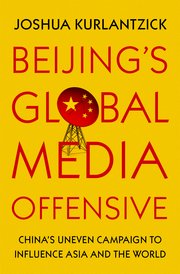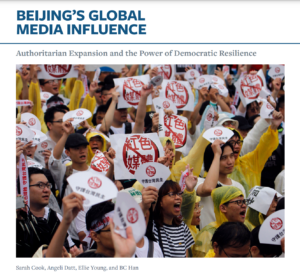The chairman of the newly established congressional select committee on the Chinese Communist Party, Representative Mike Gallagher, revealed that Disney CEO Bob Iger and NBA commissioner Adam Silver would be the first witnesses called to testify before the bipartisan panel, National Review reports:
Under Iger, Disney’s operations in China flourished, and the company shot a live-action remake of the film Mulan in Xinjiang, where Beijing is carrying out a campaign against Uyghurs. Silver has similarly defended the NBA’s business entanglements in China, and in 2019 he deleted a tweet that he had initially posted to defend Houston Rockets general manager Daryl Morey over his comments supporting Hong Kong’s pro-democracy movement.

National Endowment for Democracy (NED)
In 2022, the United Nations and other international bodies consistently turned the spotlight on China, particularly its treatment of the Muslim minority Uyghurs, says Human Rights Watch. Increased scrutiny and the recent spate of protests against President Xi Jinping’s “zero-COVID” strategy have “put Beijing on the defensive” internationally, the group observes in its newly-released annual world report.
On this week’s Mosaic podcast, inspired by a conversation he had with the Dalai Lama of Tibet, Carl Gershman, former and founding president of the National Endowment for Democracy (NED) and a Senior Fellow at the Raoul Wallenberg Centre for Human Rights, talks with Mosaic’s editor Jonathan Silver about the plight of the Uyghurs, how Jews have improbably survived throughout the ages, and what survival strategies the Uyghurs might be able to apply to their own situation.

National Endowment for Democracy (NED)
China’s economic success story undoubtedly enhances its soft power, especially vis-à-vis other developing and emerging markets. And its ability to grant or deny access to its domestic market gives it hard-power leverage, which its authoritarian politics and mercantilist practices allow it to wield freely, notes Harvard University’s Joseph S. Nye, Jr. But the US still has at least five long-term advantages, he writes for ASPI’s Strategist:
- One is geography. The US is surrounded by two oceans and two friendly neighbours; China, by contrast, shares a border with 14 other countries and is engaged in territorial disputes across the region.
- The US also has an energy advantage. The shale revolution transformed it into a net energy exporter, whereas China has become ever more dependent on energy imports.
- Third, the US derives unrivalled financial power from its large transnational financial institutions and the international role of the dollar. Only a small fraction of total foreign-exchange reserves is denominated in renminbi, while 59% are held in dollars….
- Fourth, the US has a relative demographic advantage. It is the only major developed country that is currently projected to hold its place (third) in the global population ranking…. China, meanwhile, will suffer a 9% decline in its working-age population—which already peaked in 2014—and India will surpass it in terms of population this year.
- Lastly, America has been at the forefront in the development of key technologies (bio, nano and information) that are central to this century’s economic growth. ….
 Building strong relations with China provides illiberal leaders such as Philippine President Ferdinand Marcos Jr. significant leverage vis-à-vis the West, especially over any potential disagreements on human rights and democracy issues, says Richard Heydarian, a Senior Lecturer at the University of the Philippines, Asian Center.
Building strong relations with China provides illiberal leaders such as Philippine President Ferdinand Marcos Jr. significant leverage vis-à-vis the West, especially over any potential disagreements on human rights and democracy issues, says Richard Heydarian, a Senior Lecturer at the University of the Philippines, Asian Center.
After all, China often prefers to deal with more authoritarian-populist leaders, who don’t subscribe to Western political values. Thus, Beijing has always considered the Marcos dynasty, which over the past century has thrived on a distinct brand of authoritarian populism, a natural ally, he writes for IPS.
 Central and Eastern Europe have been two of the areas China has targeted over the past decade for its influence offensive, says Council on Foreign Relations expert Joshua Kurlantzick. But in the past three years, China’s efforts in Central and Eastern Europe have collapsed, he writes in a new World Politics Review article available here.
Central and Eastern Europe have been two of the areas China has targeted over the past decade for its influence offensive, says Council on Foreign Relations expert Joshua Kurlantzick. But in the past three years, China’s efforts in Central and Eastern Europe have collapsed, he writes in a new World Politics Review article available here.
Countries with strong civil societies or more robust international support, such as in the Baltics, have appeared better equipped to identify and mitigate malign foreign influence strategies, adds CEPA’s Amelia Martin. How are the CCP’s tactics evolving, why has the impact of these influence operations varied, and how can democracies more effectively counter disinformation and propaganda? these questions will be addressed at a meeting (above) hosted in partnership with Freedom House.
Chinese Media Influence: Lessons Learned from Central and Eastern Europe. January 17, 2023 at 10:00 am to 11:00 am. Speakers:
Martin Hála, Founder and Director, Sinopsis
Ana Krstinovska, Founder and President, ESTIMA
Edward Lucas, Senior Fellow and  Senior Adviser, Center for European Policy Analysis
Senior Adviser, Center for European Policy Analysis
Ellie Young, Research Analyst for China, Hong Kong, and Taiwan, Freedom House
Moderated By:
Kevin Sheives, Deputy Director, The International Forum for Democratic Studies, National Endowment for Democracy.







